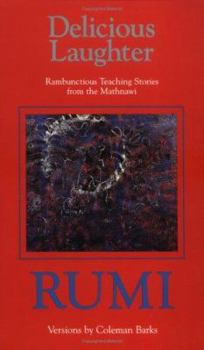Delicious Laughter: Rambunctious Teaching Stories from the Mathnawi
Rowdy, ecstatic, and sometimes stern, these parables reveal new and very human properties in Rumi's vision. Included here are the notorious 'Latin Parts' that Reynold Nicholson felt were too unseemly... This description may be from another edition of this product.
Format:Paperback
Language:English
ISBN:0961891610
ISBN13:9780961891619
Release Date:January 1990
Publisher:Maypop Books
Length:146 Pages
Weight:0.58 lbs.
Dimensions:0.5" x 5.5" x 9.0"
Customer Reviews
4 ratings
Laugh, Laugh, Laugh
Published by Thriftbooks.com User , 17 years ago
Once again, Coleman Barks translating Rumi equals a huge blessing in my life. I was thrilled to learn that these stories from "Mathnawi" are translations of Rumi's "Couplets", teaching stories poetically told. These are stories created to be retold, read aloud, discussed, debated, unfolded, sniffed, thrown in a river and caught several miles downstream with the laughter still gurling forth... as well as the "a-ha's" because naturally, with Rumi, humor is a valuable source of personal growth and reflection. This section touched me deeply: "Pay attention to your mean thoughts. That sourness may be a blessing, as an overcast day brings rain for the roses and relief to the dry soil. Don't look so sourly at your sourness. It may be it is carrying what you most deeply need and want. What seems to be keeping you from joy may be what leads you to joy." "Don't call it a dead branch, call it the live, moist root." Ahhhh, how I treasure all of the words in "Delicious Laughter".
Lost in translation
Published by Thriftbooks.com User , 18 years ago
Jelaludin Rumi is, as we all know a true poet of the heart. Although, when his passages were originally recorded in persian we must be reminded that our texts we now purchase in book stores have become hazy and sometimes unclear from the inter-language transformation. In this volume, Coleman Barks takes Nicholoson's translations from latin to english. Nicholoson translated Rumi's poetry into a more literal form. I suggest that in reading a volume of work translated to something as closely literal as possible to the original you will recieve more of a true insight to Rumi's thoughts. Another good source to defintly own by Rumi would be "Open Secret : Versions of Rumi"
The Divine Comedy of a Comic Saint?
Published by Thriftbooks.com User , 24 years ago
Delicious Laughter is Coleman Barks's collection of some of Maulana Rumi's most uproarious stories from the Mathnavi. But I must warn you potential reader: many of the narratives in this compilation are quite explicit - *definitely* not for puritanical prudes. The thing to remember is that Rumi uses these graphic images to make a point. His stories are not just crude attempts to make us chuckle. Rather, he seeks to lay bare the various impulses that push and pull us - impulses that in fact make up the Divine Comedy of human existence. Behind all of these impulses lies the Grand Impulse, which is our inate yet unconscious yearning for the Object of our existence - the Eternal Beloved - like water drops seeking a return to the ocean, or flowers naturally turning towards the sun. As long as this is kept in mind, Rumi's humour will reveal itself for what it is: a key to a higher and more profound understanding of what makes us human. Through this key the grand narrative behind the apparently incoherent and disjointed fables and stories will unlock itself.
Solid source for Sufi teaching tales
Published by Thriftbooks.com User , 24 years ago
Delicious Laughter is a secondary translation of teaching tales in verse by Rumi. By secondary translation I mean that Coleman Barks does not translate directly but works with others who can read the origin. However, Barks' sense of poetry, meaning and story make his versions excellent. Many of the stories are known to the Western world via Idries Shah's work, some through de Mello, others have moved East and West through time. However, many of the tales will be unfamilar to the reader - some of which will remind us of the international character of Rumi's environment.In "Chinese Art and Greek Art" there is a contest to see which art is best - the Chinese complete a stunning piece of art on their wall. The Greeks polish their wall so brightly that it reflects the Chinese work. ... the moral is ... (read the book to find out).





